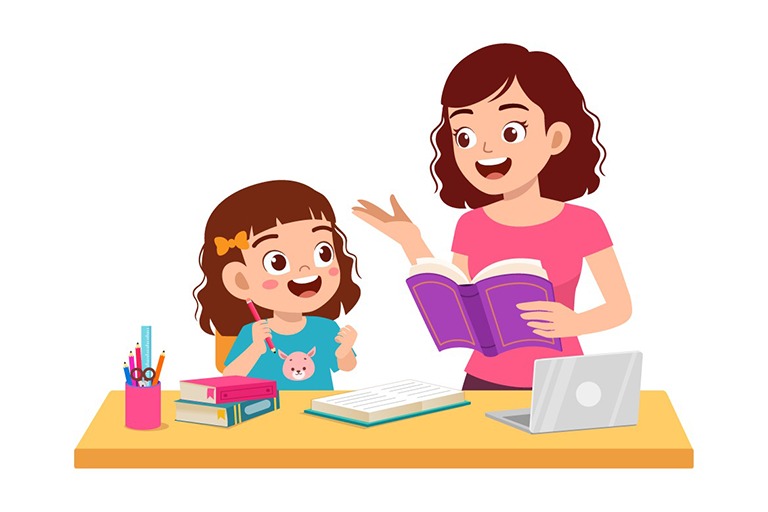5 PRACTICAL PARENTING TIPS
Practical parenting focuses on teaching children what type of behavior is acceptable. It helps to get the desired behavior we want and allows children to become mentally healthier and better adjusted. Here are 5 practical parenting tips to help you deal with yourself and with your children.
-
Talk to your kids and spend quality time with them
Children like hugs, cuddles, and holding hands. Show them the affection they desire. If they are not overly affectionate, that is okay. Understand how your child likes to be cared for and consoled. Your children need positive attention. If they do not receive positive attention from their family, they may choose to seek out negative attention. This is because even unfavorable attention is preferable to be ignored. So, remember to communicate with your child.
-
Guide your child through their mistakes & weaknesses
All children misbehave at times, and you will inevitably have some discipline challenges. Trying to be the perfect parent and expecting a perfectly behaved child can set you up for frustration and disappointment. Normally children are more likely to misbehave when they are bored. So, provide lots of engaging indoor and outdoor activities to your child such as reading, games, puzzles, nature walks, blanket tents, etc.
- Punishing a child is not as effective as using praise and rewards. Find strategies to help your child reach their full potential rather than focusing on their shortcomings. Children will develop talents to make up for any deficits if they are encouraged to do so.
- Don’t react emotionally negatively to your child’s actions. Negative reactions like rage, sarcasm, and ridicule will only make your child feel worse if they struggle with self-control. Choose your words carefully and be compassionate. Let your child know that everyone makes mistakes and that you still love them, even when you do not love their behavior. Never react in a manner that conveys the message that behind bad behavior, there is a bad person. Nobody would like to feel like a bad person. Normalize the mistake, we need to feel like good people, who are accepted by other people. Nobody likes to feel alone or singled out. So, in discussion with the child, tell them, that it is okay, everyone makes mistakes. For most mistakes, you can find something similar in your life, and this is the ultimate normalization. Because you are making them feel included.
- Isolate the mistake from the person, as much as possible. When you talk to the child, they must feel that when my parent considers me more than a mistake. You need to convey to the child that, you see them in totality. See their good behavior and bad behavior. See their personality strengths and weaknesses.
Overall, you need to give the message to the child, “You are a good person who makes mistakes at times.” instead of, “You are a troublesome kid, who does good things occasionally.”
-
Boost your child’s self-esteem
Your words and actions as a parent affect the child’s developing self-esteem more than anything else. They see themselves through your eyes. They take in every aspect of your expression, including your voice and body language. Praising accomplishments, however small, will make them feel proud; letting the child do things independently will make them feel capable and strong. The more effective approach is to catch them doing something right like- “You made your bed without being asked that’s terrific!” or I noticed how patient you were as you played with your sister.
These words will do more to support positive behavior and self-assurance. Make it a point to find something positive to say each day. Give out incentives freely. Your affection, hugs, and compliments are powerful.
-
Help your child become an independent person.
- If you want a responsible child, let them do their things. Even if it means, they lose a few marks, or their room is dirty or they hate you for a few minutes. Skills develop through doing. Do fewer and fewer things for them.
- Don’t protect them too much, for example, if your child is scared to talk to a neighbor for the ball, don’t go and get it for them. I know as a parent it is your first instinct to keep your child safe. But if you want an independent and responsible child you will need to develop some risk tolerance. You need to develop a tolerance for your child crying, being scared, hurt, etc. These negative emotions felt by the child are the breeding ground for some of the most important lessons they can learn in life. Let them experience obstacles, and let them be uncomfortable at times. But make sure to build a connection strong enough, that they feel comfortable talking to you about those obstacles or failures. And when they do talk, give them the best wisdom you have.
- Don’t take all decisions for them. Let them make more and more choices. If you want them to be responsible, you will need to give them choices and more and more authority in taking the decisions. If you want an independent and responsible child, don’t take away the opportunities where they can practice independence and responsibility. Let them practice the same under your supervision.
Do not forget to take care of yourself.
Being a composed, unhurried parent is challenging. Try to schedule some downtime or do something you enjoy every day or at least once a week if you feel stressed, anxious, or depressed. Although it can be challenging, allow yourself to take some time for yourself.
You may learn and practice meditation. Spiritual and religious practices are extremely useful tool that frequently offers a powerful coping mechanism. It fosters tranquilly. We may acknowledge that both good and bad things will occur in life when we have faith in a power bigger than ourselves.
Spirituality can help us get rid of, or at least lessen, the need to constantly blame ourselves for negative circumstances, and it motivates us to work hard to produce positive results. Children are copy machines; therefore they will pick up these coping mechanisms that will make them better people.
Adopting these practical parenting tips for your family may take a little adjusting, but stick with it, and you will see and love the results. When we take compassion and kindness into parenting practices, we are going to have much better outcomes and the whole family is going to be happier and healthier. Hope these practical parenting tips help you deal with yourself and with your children.
Watch Challenges of Parenting in Present Times
and Learn more on Parenting Skills
Pooja Kapoor (Research Scholar), Counsellor & Hypnotherapist, YOUR Confidant





